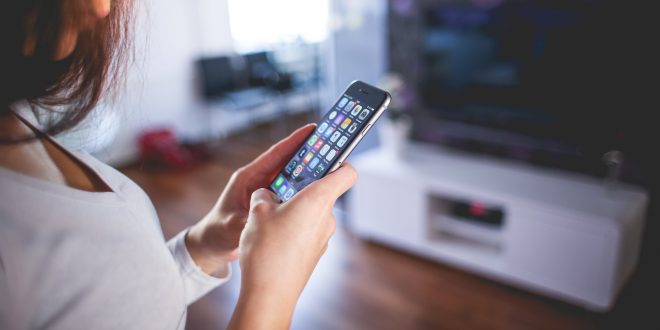There is growing research demonstrating that mobile apps can be used to improve mental health and help address many common psychological disorders (e.g., Firth et al., 2017; Torous, Levin, Ahern & Oser, 2017). Typically, these apps teach new psychological skills to users to learn how to better cope with difficult thoughts, feelings, and other internal experiences, and to meet personal goals. However, there are a lot of ways that apps can do this, and the unique features of mobile apps open up a new world of opportunities for ways of improving mental health.
The current study we recently published in Cognitive Behaviour Therapy examined one key feature of mobile apps – the ability to provide tailored skills based on how someone is doing in-the-moment. People typically use their smartphones throughout the day, regularly responding to prompts or checking apps. In this study, we sought to leverage this habit to teach psychological skills by checking in at random times throughout the day, and using those check in opportunities to give an option to get a tailored skill. These skills were based on Acceptance and Commitment Therapy (ACT; Hayes, Strosahl & Wilson, 2011), a modern cognitive behavioral therapy that includes skills that might be more effective when tailored to in-the-moment challenges including attending to the present, connecting with personal values, accepting difficult emotions, and defusing from thoughts (noticing thoughts as just thoughts).
We conducted a randomized controlled trial (RCT) with 69 adults who were interested in using a self-help app to improve their well-being (Levin, Haeger & Cruz, in press). Participants were randomly assigned to either the tailored ACT app, a random version of the app where skills were not tailored based on in-the-moment responses, or an assessment-only version where participants completed check-ins but did not receive skills. In another publication we reported the main results, which indicated that only participants who received the tailored ACT app improved on psychological distress and positive psychosocial functioning over time, and that these participants improved more than those who received the assessment-only or random skill app (Levin et al., in press).
Our article published in Cognitive Behaviour Therapy reported results from the mobile app data in the tailored and random skill conditions to further examine how the effects of ACT skill coaching in-the-moment. After each skill coaching session, participants completed another check-in assessment to see how things changed from practicing a skill. This allowed us to look at the immediate effects of skill coaching. Our results showed that in both the random and tailored skill conditions, participants improved immediately after skill coaching on their level of depression, anxiety, ability to do what matters, and tailored variables relevant to ACT skills (how much they were fighting their feelings, stuck in thoughts, running on “autopilot,” and disconnected from values). We also found that participants improved more from tailored skill coaching than random skill coaching on their in-the-moment anxiety and how much they were fighting their feelings and stuck in thoughts. However, the changes from before to after skill coaching were all fairly small.
These results suggest that ACT skill coaching can produce immediate improvements in users’ psychological distress and functioning, and that these in-the-moment effects can be larger in some cases when the skill is tailored to the current situation. The small effects suggest that any given skill coaching session may be pretty modest in terms of improvements that people notice, but over time, this can produce clinically meaningful improvements (see Levin et al., in press for main outcome findings). Future research is needed to further our understanding of the user’s experience of in-the-moment effects and how in-the-moment effects predict clinically meaningful outcomes over time, which might inform further guidance on how to use an app or adapt it to make sure it is most helpful to users. We hope that this further informs and guides app developers and researchers in developing tailored skill coaching methods and examining these in-the-moment effects.
Read the full paper: Levin, M. E., Navarro, C., Cruz, R. A., & Haeger, J. (in press). Comparing in-the-moment skill coaching effects from tailored versus non-tailored acceptance and commitment therapy mobile apps in a non-clinical sample. Cognitive Behaviour Therapy. doi:10.1080/16506073.2018.1503706

References
Firth, J., Torous, J., Nicholas, J., Carney, R., Rosenbaum, S. & Sarris, J. (2017) Can smartphone mental health interventions reduce symptoms of anxiety? A meta-analysis of randomized controlled trials. Journal of Affective Disorders, 218, 15-22.
Hayes, S.C., Strosahl, K.D., & Wilson, K.G. (2011). Acceptance and Commitment Therapy: The process and practice of mindful change. New York: The Guilford Press.
Levin, M.E., Haeger, J. & Cruz, R.A. (In Press). Tailoring acceptance and commitment therapy skill coaching in-the-moment through smartphones: Results from a randomized controlled trial. Mindfulness.
Torous, J.B., Levin, M.E., Ahern, D. & Oser, M. (2017). Cognitive behavioral mobile applications: Research literature, marketplace data, and evaluation guidelines. Cognitive and Behavioral Practice, 24, 215-225.
Photo by: Matt Madd
 Cognitive Behaviour Therapy A peer reviewed, multidisciplinary journal devoted to the application of behavioural and cognitive sciences to clinical psychology and psychotherapy.
Cognitive Behaviour Therapy A peer reviewed, multidisciplinary journal devoted to the application of behavioural and cognitive sciences to clinical psychology and psychotherapy.




